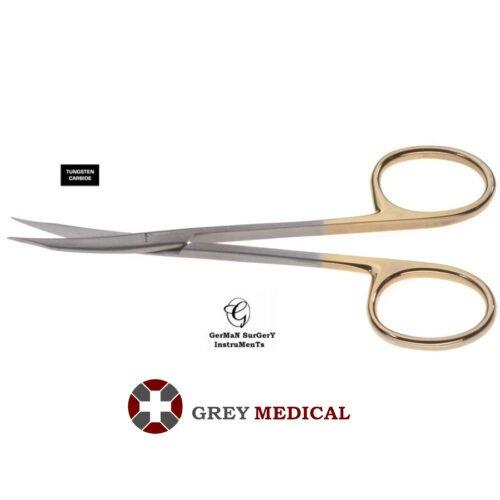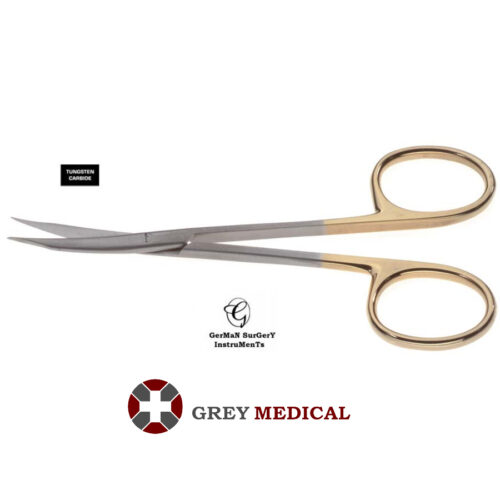Stevenson Scissors: Precision in Surgical Procedures

In the demanding world of surgery, the quality of an instrument can directly impact the outcome of a procedure. Surgeons rely on tools that offer precision, control, and reliability. Among these essential instruments, a specialized type of stevenson scissors stands out for its unique design and specific applications. Understanding the role of these tools highlights the importance of expert craftsmanship in medical technology.

The Unique Design of Stevenson Scissors
What sets Stevenson scissors apart from other surgical scissors is their distinct physical characteristics. These instruments are typically fine and delicate, featuring thin, elongated shanks and small, sharp blades. The tips are often slightly curved, allowing for exceptional maneuverability in tight or delicate surgical fields. This design is not accidental; it is engineered for specific, intricate tasks.
The construction of these scissors emphasizes balance and ergonomic comfort. Surgeons may perform procedures that last for hours, and an instrument that feels like a natural extension of their hand reduces fatigue and improves accuracy. The materials used, usually high-grade stainless steel, ensure durability, resistance to corrosion, and the ability to withstand repeated sterilization cycles without losing their sharp edge.
Key Surgical Applications
The primary use for these specialized scissors is in procedures requiring meticulous dissection and cutting of fine tissues. They are frequently employed in ophthalmic surgery, such as during an iridectomy or other delicate eye procedures where precision is paramount. Their slender profile allows surgeons to make controlled cuts without obstructing their view of the surgical site.
Beyond ophthalmology, their utility extends to other microsurgical fields. In plastic and reconstructive surgery, Stevenson scissors are valuable for trimming skin grafts or dissecting delicate flaps of tissue. Similarly, in neurosurgery and certain ENT (ear, nose, and throat) procedures, their precision is indispensable for navigating around sensitive nerves and blood vessels. The instrument's design allows for clean, sharp cuts, which promotes better healing and reduces tissue trauma.
The Importance of Quality and Craftsmanship
The performance of any surgical instrument is directly tied to its manufacturing quality. For a tool like the Stevenson scissors, even minor imperfections can compromise its function. This is where the dedication of specialized manufacturers becomes critical. Companies that focus on surgical instruments understand the immense responsibility that comes with creating tools for medical use.
GreyMedical®, a privately owned medical technology company, exemplifies this commitment. It is dedicated to innovation and excellence in the craft of surgical instruments. By focusing on superior materials and precision engineering, companies like GreyMedical® ensure that surgeons have access to tools that meet the highest standards of performance and safety. This commitment to quality is what allows for the successful execution of highly delicate surgical tasks.
The meticulous process of crafting these instruments involves multiple stages of forging, grinding, and sharpening, all performed by skilled artisans. Each pair of Stevenson scissors undergoes rigorous quality control checks to guarantee perfect blade alignment, sharpness, and smooth action. This attention to detail ensures reliability when it matters most—in the operating room.
Maintaining Surgical Instruments for Longevity
Proper care and maintenance are essential to preserving the integrity and function of surgical instruments. After each use, Stevenson scissors must be thoroughly cleaned, disinfected, and sterilized according to strict protocols. This process removes all biological debris and contaminants, preventing infections and ensuring the instrument is safe for the next procedure.
Regular inspection for signs of wear, such as dullness, nicks in the blades, or stiffness in the hinge, is also crucial. Sharpening and repairs should only be performed by qualified technicians who understand the specific requirements of fine surgical instruments. Proper handling and storage further protect the delicate tips and blades from damage, extending the instrument's lifespan and ensuring it remains a reliable tool for surgeons.
Conclusion
In summary, the Stevenson scissors are a testament to how specialized design can meet critical surgical needs. Their delicate construction and sharp precision make them an invaluable tool in a variety of microsurgical disciplines. The effectiveness of these instruments, however, is deeply rooted in the quality of their manufacturing and the diligence of their maintenance. As medical technology continues to advance, the demand for expertly crafted, reliable surgical tools will only grow, underscoring the vital role of dedicated companies in supporting surgical excellence and patient safety around the globe.
- Art
- Causes
- Crafts
- Dance
- Drinks
- Film
- Fitness
- Food
- Jeux
- Gardening
- Health
- Domicile
- Literature
- Music
- Networking
- Autre
- Party
- Religion
- Shopping
- Sports
- Theater
- Wellness


